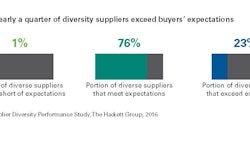By Raj Sharma
Supplier diversity programs, while increasingly a key component of leading companies' supply management strategies, still face an uphill battle within most companies. Why? For one, many supply management leaders view supplier diversity goals as working against broader objectives to cut costs and consolidate supply bases. Companies also face challenges in "selling" the value of these programs to their customers and building a convincing business case. Additionally, companies often are unfocused and generic in their implementation approach, leaving value on the table.
While there are many other challenges associated with the implementation and management of supplier diversity programs, we address the three issues cited above, given the impact that they can have on overall value generated.
The Business Case for Supplier Diversity
Based on our experience working with numerous organizations, supplier diversity programs have never been more important than today. There are a number of drivers that strengthen the case for supplier diversity, including demographic shifts in the general U.S. population, the need for compliance with small business goals and alignment with broader supply management objectives.
Demographic shift — It is a well-known fact that minorities will become the majority in the coming decades in the United States. Naturally, the changing demographics have also led to an increase in the number and types of small businesses being started by minorities. For example, between 1997 and 2002, the number of women-owned firms overall increased by 19.8 percent, according to the "Small Business Economy" report to the president last year. Contrary to popular belief that diversity businesses generally provide commoditized products and services, large proportions of those firms are in the professional, scientific and technical fields. If firms are to continually find new and capable suppliers, chances are that many of them will be diverse suppliers.
From an end-consumer perspective, a diverse supply chain can become a great "selling" point to local and community leaders of various ethnic groups. Just as Japanese companies tout their American supply bases to their American consumers, companies can cite the value and benefit created for communities through the use of diverse suppliers.
Compliance with small business goals — With government purchasing rising to above $400 billion last year just within the federal government, small business compliance has become a necessity for companies serving the government or looking to enter the government market. Innovative programs that lead to compliance with government small business goals can become a source of competitive advantage and new business. Companies that truly differentiate themselves in this arena proactively develop and manage their supplier diversity programs to ensure value that goes beyond compliance.
Beyond government, however, many large Fortune 500 companies are setting supplier diversity goals for their supply chain partners. It is not uncommon for commercial companies to assess diversity initiatives of their own supply base. Being complacent can mean a direct impact on revenue.
Alignment with supply management objectives — Rather than conflict with supply management goals such as cost reduction, supplier diversity programs are a key facet supporting those goals. Small and diverse businesses typically have lower cost structures (meaning better value), are more creative and innovative, and can provide a customer focus beyond what larger firms can offer. Larger companies often embrace small companies with large potential, investing in them to help them realize their full potential. The benefit is a close and trusting relationship that can often become a source of competitive advantage.
In conclusion, there is growing evidence for a link between increased supplier diversity and increases in shareholder value. What separates the most successful companies is their ability to effectively communicate the drivers for the business case throughout their organizations. With a strong internal commitment to supplier diversity, successful companies are building a new type of competitive advantage that will enable them to more effectively leverage the value of a diverse supply base.
About the Author: Raj Sharma is founder, president and CEO of Censeo Consulting Group. He has more than 14 years of experience working with and advising senior management of Fortune 500 companies and federal government agencies on how to address complex business issues related to supply chain and procurement. Prior to founding Censeo in 2003, he held several sourcing and supply chain management positions at Booz Allen Hamilton and FreeMarkets (now part of Ariba).



















